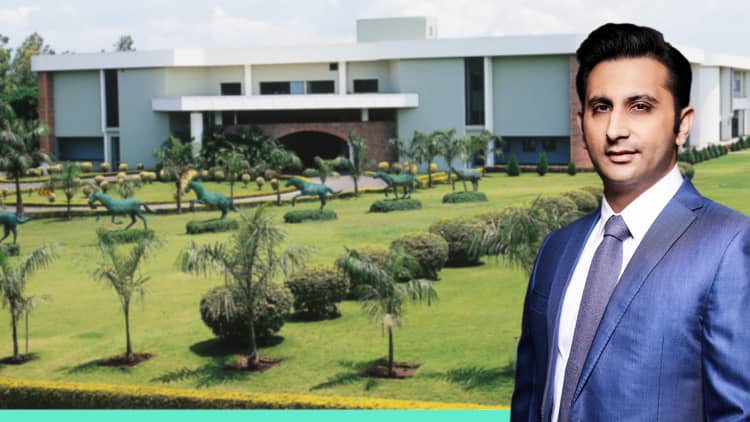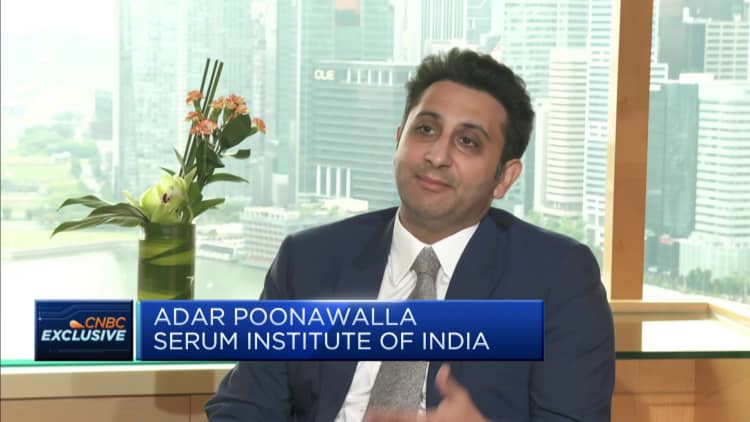Adar Poonawalla became the CEO of the world’s largest vaccine manufacturer, Serum Institute of India, when he was 30 years old.
| Bloomberg | Getty Images
Adar Poonawalla became the CEO of the world’s largest vaccine manufacturer, Serum Institute of India, when he was 30 years old.
But that was not his first foray into the family business.
“I started, you know, at the grassroot level. I worked in every department — and particularly in marketing and sales and in exports, because I wanted to build the exports,” explained the now 41-year-old CEO.
The company has come a long way since he took over in 2011.
Today, it is the world’s largest vaccine manufacturer — by number of doses produced and sold globally. According to the company, it is “supplying the world’s least expensive and WHO-accredited vaccines to as many as 170 countries.”
Adar steered the company at the height of the global pandemic. During that time, Serum Institute scaled up its production for Covid vaccines to meet global demand, and began manufacturing Covishield in India — a vaccine co-developed by AstraZeneca and the University of Oxford, that is domestically produced.

According to India’s health ministry, Covishield accounts for close to 80% of the total vaccines administered in India to date.
“We invested around $2 billion, in the last two years,” Adar said, adding that the completed pandemic facility “doubled our capacity.”
“We produced 1.9 billion doses in just 2021, after having committed only a billion doses, so we did double of what we had committed.”
They are now able to produce 4 billion doses of various vaccines in the new facility, according to Adar.
The man behind
It was Adar’s father, Cyrus Poonawalla, who founded the Serum Institute of India in 1966 — against the backdrop of a country flooded with imported life-saving vaccines. However, the high cost of the drugs meant they were practically inaccessible to most of India’s population.
Cyrus never envisioned himself in the pharmaceutical industry — in fact, he was a horse breeder who inherited his family’s racehorse breeding farm.
But he soon learned that horse serum was a vital ingredient in many vaccines, and that many of the retired horses from his farm were donated to state-owned Haffkine Institute to produce vaccines.
At the same time, Cyrus realized immunization rates remained low in India, partly due to the high prices of imported vaccines.
In 1966, at the age of 25, the elder Poonawalla embarked on a journey to set up the Serum Institute of India.
The company’s first product was the tetanus vaccine in 1967.
A new generation
Following in his father’s footsteps, Adar is still working toward the company’s early aspirations to produce affordably priced vaccines.
“We could have charged higher prices. But we didn’t,” he told CNBC Make It. “We didn’t want to sort of take advantage beyond the point. We just wanted to make a product, which is as accessible and affordable.”
Leveraging on their economies of scale to minimize cost, his company has now become the world’s largest vaccine producer, with an estimated 65% of children globally having been administered a Serum institute of India vaccine, according to the company.

Through time and experience, Adar was able to understand and predict global trends and demand, which made him even more determined to secure sufficient supply. It was this forward planning that contributed to Serum’s successful and active engagement during the pandemic.
Thanks to his foresight, that decision “really came in handy even during the Covid crisis” and the company has “extra capacity.”
Adar’s extensive travels also meant he was meeting people from different places and could “understand where the global demand was going.”
This knowledge was a driving factor that encouraged him to build enough capacity to ensure the company was able to produce enough in order to meet the growing global demand.
Bumpy road ahead
However, success did not come easy.
Setting up the company was a “huge hurdle” for his father back in the 70s, who needed to get permissions and licenses, Adar said.
Acquiring sufficient capital to kick-start the business also proved challenging for Cyrus, who “had no track record, no brand name,” he explained.
Vaccine production at the Serum Institute of India pharmaceutical plant in Pune, Maharashtra, India. Like the rest of the world, the vaccine manufacturer is currently moving away from its heavy focus on Covid-19 vaccines, and shifting to expand its portfolio of products.
Bloomberg | Bloomberg | Getty Images
Shortly after joining the company, Adar was determined to boost their production volume when he realized the company was always missing out on “new opportunities.”
This awareness made it “very obvious and very straightforward” for him to invest in capacity, Adar told CNBC Make It.
With the heightened urgency for Covid vaccines worldwide as the pandemic spread, Adar was determined to make realistic promises to meet the vaccine demand.
“You can make billions of doses if you’re given one or two years, but to make it in three or four months — that is what the world really needed” — that’s where managing those expectations was crucial, Adar emphasized.
The next chapter
Like the rest of the world, Serum Institute of India is moving away from its heavy reliance on Covid-19 vaccines, and is now shifting its focus to expand its portfolio of products.
As the company develops, Adar said he’s looking at breaking into new markets.
“I’m looking at now expanding more with my portfolio of vaccines in Europe and the United States.”

Meanwhile, the CEO said he remains hopeful the world can be better prepared for future pandemics if there are measures implemented now.
“We know what we need to do,” he explained. “But are we doing it is the question that I think the leaders will have to look at.”
Adar said he remains enthusiastic about serving other low-income countries such as the African Continent and Asia to provide them with affordable access to life-saving immunizations.
“I’m quite frankly quite relieved that the Covid pandemic is nearing the end — because I can get back to my vaccines in my pipeline that I had been developing for the last few years,” Adar said.
“I just want to get back to that. And I’m looking forward to that.”
Stay connected with us on social media platform for instant update click here to join our Twitter, & Facebook
We are now on Telegram. Click here to join our channel (@TechiUpdate) and stay updated with the latest Technology headlines.
For all the latest Health News Click Here
For the latest news and updates, follow us on Google News.
